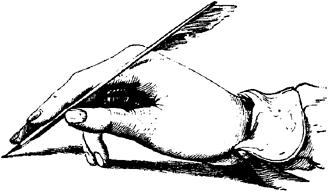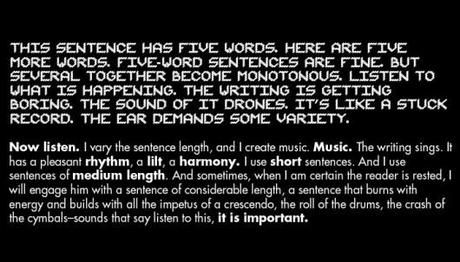 A lot of people tell me that I have a "Writer's Touch", but what does that really mean?
A lot of people tell me that I have a "Writer's Touch", but what does that really mean?There seems to be a very fine line between writing something and speaking it. Illustrating something and simply describing it or simply talking about it. I've recently thought over the differences and decided to blog about it; here's what I came up with.
Detail
Having a writer's touch means that you show enough detail to allow someone to visualize your scenario more clearly. So, if you have a sentence like "Sally's dog explored the park." You'll write it "Sally's dog padded along the park trail." So now, you know exactly what the dog was doing, and now you know that he's walking gently and curiously along a trail. He's not all over the place in your mind now, so this narrows the reader's vision to what you want to illustrate.
Strong Words V. Weaker Words
This one's simply; can you take a basic word and substitute it for a more complex word that gives what you're trying to say more meaning?
Can you replace the word "crowded" for the word "bustling" if you're talking about say, New York City? I mean think about it, they both give you different vibes. Crowded seems more like stuffy and uncomfortable, whereas bustling gives you the idea that it's a city that's busy at work, doing things, everyone's out and about. So yeah, it's crowded, but is it that to the point of uncomfortableness? Probably not. So the word "bustling" gives the impression that the city's full of people, but they're walking about and it gives sort of the business-like impression of walking the street, rather than the "crowded waiting room" scene. Am I making sense?
Showing, Not Telling
Similar to putting detail, having a writer's touch means that you have the ability to choose words and form based on what kind of a vibe you want in the sentence. For an example, if you're talking about a situation that's happened, but you want to let on that it was boring without actually saying it was, you make what happened sound really boring, and people would catch on. But I'm not saying make your writing boring but use words that give off a boring vibe...
I'm not making sense here.
Okay take a look at this: "I was bored, so I slept." This sentence is totally fine, but imagine if I wrote it like this: "I sat on my bed and looked around the shabby place I call my room. I sighed. God I need to clean this place up. I thought to myself. Nothing to do, nowhere to go. I'll probably get to it later, I'm not feeling up to it. I took one last look at my room and yawned. I lay back in my bed and drifted off."
Now obviously it's all about context. You wouldn't write all that if someone asked you why you're sleeping during the day, but say you're writing a story. Wouldn't you rather have all that detail to put the reader in the scene and have them immersed in your writing. That's the touch you need.
Are swear words okay?
I've recently been...er...shamed, for using the so-called "d-word" in one of my posts. Let me assure you there is a reason for every word I choose to write. Had I thought another word was more suitable, I would have changed it. Everyone I know has the impression that I don't swear, and it's true. I never have conversations where I'm spitting out swear words. Writing is different though. Writing is about getting the right impression across, and the words a writer chooses aren't always ones that they use conversationally, andd they're not always representative to the author's voice. I wouldn't use the word "damn" conversationally when talking to people, but when I write, I use it in context to give off an angry, frustrated vibe. Had the word not been chosen, it would be taken as a light statement. Now, I'm not saying that swearing is right, but I'm also against the idea that it's wrong in some cases. Note that in some contexts, how it it bad if I'm not addressing a person? I was addressing a bad idea, so in all essence, bad ideas be damned! Okay?
Shorter Sentences Vs. Longer Ones
This best represents the idea:

Moral of the story? Variety of sentence length gives music to the writing.
To sum it all up, writing isn't only about the grammar and expressive punctuation that you write, but how you write it and how advanced your diction (word choice) is. I'm still working on mine, don't get me wrong, I'm not an expert, but giving your work a writer's touch gives it a flare that can keep readers, well, reading. As a final example, there's a difference between saying "She was hungry so she ate an apple" versus "Hunger gnawed at her stomach and clawed at her insides. She grabbed an apple from the basket sitting on the nearby nearby table and took a bite from the juicy inside, the sweet juice dribbling from her chin as she savored every bite."
What would you rather read?
Thing is though, some people call this fluff, specifically when it's used in a college paper. Trust me, my professors hate it when I write like this, as they want the paper straight to the point. Problem is, what's the fun in that?
So I do it anyway, but I tone it down a bit.

